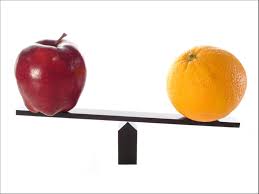compare
英 [kəmˈpeər]
美 [kəmˈper]
- n. 比较
- vt. 比拟,喻为;[语]构成
- vi. 相比,匹敌;比较,区别;比拟(常与to连用)
- n. (Compare)人名;(意)孔帕雷
使用频率:

记忆方法
记忆“compare”可以通过联想它的组成部分:“com”和“pare”。想象自己“com”起来(组合)两块“pare”苹果(把“pare”理解成“削皮”,因为pare原意是削皮),比较它们的相似之处或差异,从而记住“compare”是“比较”的意思。
以上内容由AI生成, 仅供参考和借鉴
中文词源
compare 比较
com-, 强调。-par, 对等,词源同pair, peer.
英语词源
- compare
-
compare: [15] Compare comes via Old French comparer from Latin comparāre ‘couple, match’, a verb based on the adjective compar ‘equal’, a compound formed from the prefix com- ‘mutually’ and pār ‘equal’ (source of English pair, peer, and parity). The Latin derivative noun comparātiō gave Old French comparesoun and hence English comparison [14].
=> pair, par, parity, peer - compare (v.)
- late 14c., from Old French comparer (12c., Modern French comparer), from Late Latin comparare "to liken, to compare" (see comparison). Related: Compared; comparing. To compare notes is from 1708. Phrase without compare (attested from 1620s, but similar phrasing dates to 1530s) seems to be altered by folk etymology from compeer "rival."
权威例句
- 1. He programmed his computer to compare all the possible combinations.
- 他给他的计算机编制了一套程序,以比较所有可能的组合。
- 2. How do the two techniques compare in terms of application?
- 这两种手法实际运用起来哪个好一些?
- 3. The more recent conifer plantations cannot yet compare with the old woodlands.
- 年代较近的针叶树林场还比不上年代久远的林场。
- 4. Childcare facilities in Britain compare unfavourably with other European countries.
- 英国的保育设施与欧洲其他国家比起来相形见绌。
- 5. It's instructive to compare his technique with Alan Bennett's.
- 把他的手法与艾伦·贝内特进行比较很富启发意义。